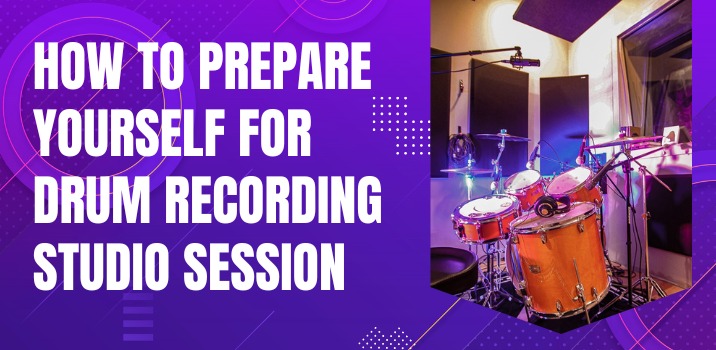How to Prepare Yourself for Drum Recording Studio Session

27-March- 2024
Whether you're a pro or an aspiring artist, recording drums in a professional recording studio can be daunting. Studio time is expensive; you cannot afford to waste it. To make the most of your studio time, you must be thoroughly prepared. To make your task easy, here, we are providing some tips for what to do before and during a drum recording studio session.
Rehearse Well For many drummers, recording their performances in a studio setting may be extremely stressful and nerve-wracking. The best you can do to get ready for it is to practice a lot and know your songs and parts by heart. If you have not practised well, it may annoy your sound engineers. Moreover, studio time is expensive hence you cannot afford to waste it on several takes. Additionally, you should be proficient with your instrument and able to play cleanly because any little error you make will be felt.
Additionally, it's critical to have a solid understanding of your instrument and be able to play cleanly since any tiny error will be accentuated when replayed with the studio speakers. Make sure to concentrate on both the regularity of your drumming velocity and the time of your playing to the click. Everyone makes mistakes but with practice, you will make a few mistakes. Try not to put too much pressure on yourself; this should be an enjoyable and fulfilling experience.
Find the right kind of recording studio You must find the right kind of studio for drum recording. Work with recording engineers who are established in your genre. For instance, if you play hip-hop music, do not work with who is good at jazz. MIX Recording Studio, the best recording studio in LA, works with aspiring and seasoned music artists. It has the knowledge and equipment to fulfil all your drum recording needs. It also offers affordable drum recording studio sessions without sacrificing the quality.
Play to a click track Playing to a click track can be one of the most time-consuming and annoying aspects of recording, particularly if you have never done it before. Without a doubt, recording to a click-track will be demanded of drummers, so you better have this down pat to prevent having the worst possible experience in the studio. While some people have a natural ability to work on time, others find it quite difficult. You can find free metronome applications available on your phone, adjust the tempo to a familiar song, and then press to play along. If you have recording equipment, record a video of yourself, click it, and listen.This audio feedback will help you prepare for the studio and is an excellent method to teach yourself how to play in time. Though it will be frustrating at home, it will pay off in the recording studio.
Prepare Your Equipment Ensure that your drum kit is in optimal condition before the drum recording studio session. Clean and tune your drums, replace any worn-out drumheads or hardware, and check that all your cymbals are free from cracks or damage. Experiment with different drumhead tensions and tuning configurations to find the best sound for each drum. Additionally, don't forget to bring spare sticks, mallets, and other essential drumming accessories to the studio.
Pack Energy essentials While you are in a recording studio, it can be stressful at times. You will need to keep yourself energized,hydrated, and fueled. Some studios may offer lunch and snacks, others may have a cafeteria and there are studios which may not have any of these options. If you're unsure, go with the latter option,pack your lunch, snacks and some drinks and have them whenever you have free time. You must be prepared in this way because you cannot expect to produce outstanding work with little energy. Avoid consuming a lot of junk food that will just cause a severe sugar crash, which may hamper your recording.
Communicate with Sound Engineers Talk with the sound engineer before the recording session. You can discuss your objectives, expectations and any special needs you may have. Mention sources or samples of drum sounds you like, and talk about how you see your drums working with the rest of the mix. The production team's advice and comments should be welcomed since their experience can help you take your recordings to the next level.
Conclusion
Hope you now have a better understanding of how to be ready for professional drum recording studio sessions. Although this isn't a definitive guide, you won't make many mistakes if you follow these instructions. You will be able to take pleasure in the encounter and make the most of the session for which you have paid good money.